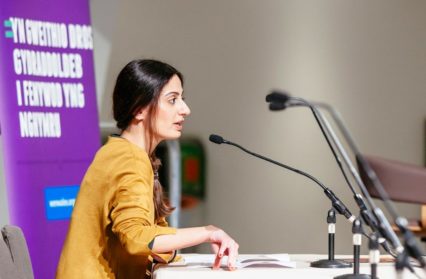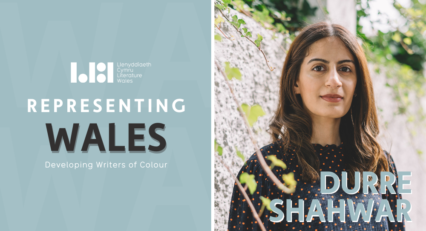Wales Arts Review is proud to present the new series, Artists in Residence. Introducing Durre Shahwar, the Artists in Resident for May and an assistant editor at Wales Arts Review… throughout 2017 artists, including Durre Shahwar will take a leading creative role in what Wales Arts Review publishes, centring their skills on a challenging project over the course of a month. We were inundated with applications, receiving hundreds of emails about the positions, and it was no easy task whittling down all that talent to this final eleven. Our team of six editors debated long into the night, and in the end, we decided on a collection of people who we most want to work with, and whose work excites us. We think you will be excited by them too.
Here is a brief outline of what we can expect from this writer.

Who?
Introducing Durre Shahwar, a Cardiff-based writer. She has a BA in English Literature and Creative Writing & an MA in Creative Writing, both from Cardiff Metropolitan University. She is a Word Factory Apprentice 2017, mentored by Alexei Sayle. In 2015, she was commended for the Robin Reeves Prize for Young Writers.
Writing
Durre’s writing explores the themes of race, identity, religion, intersectional feminism, mental health. Hoping for catharsis through fictionalisation, Durre draws a lot of material from the self in an attempt to universalise the individual experience. Preferring ‘voice’ over plot, she writes short stories, creative non-fiction and sometimes poetry. Her work has been featured in various publications and anthologies, including Sister-hood Magazine, The Stockholm Review of Literature, and is due to be published in the upcoming issue #7 of The Lonely Crowd, Cheval 10 (Terry Hetherington Young Writers Award 2017) and Know Your Place (Dead Ink Books).
Maxim
“Be so good that they can’t ignore you” (it has flaws, but it has truth in it, too).
The Residency
For my residency, I will be exploring the topic of mental health to commemorate Mental Health Awareness Week. I will be approaching this year’s theme of ‘Surviving or Thriving?’ through the lens of creativity, in conjunction with the idea behind Time to Talk; how creativity, writing through adversity and forms of bibliotherapy can alleviate mental health problems along with other forms of therapy. I’ll be sharing my own writing, as well others’ in order to raise awareness and provide a platform for various voices and issues of mental health and the way it is experienced by people from different walks of life. This project has already evolved since the original pitch, and so I hope that it will continue to do so throughout the course of this month, resulting in a learning experience for both myself and the readers.

The following are the Wales Arts Review pieces that Shawhwar has contributed throughout his residency with us.
Additional Artists in Residence pieces by the other selected artists are available also.
Surviving or Thriving by Durre Shahwar | A.i.R
In this Artists in Residence piece, Shahwar reflects on the ‘surviving or thriving’ logic and how writing can help with mental health.
AI Wanted To Tell You by Durre Shahwar | A.i.R Poetry
I Wanted to Tell You is a poem by our Artist in Resident this month, Durre Shahwar which talks about the difficulties of mental health.
Freewriting Extracts by Durre Shahwar | A.i.R
The Artist in Residence for May, Durre Shahwar offers a selection of freewriting extracts in this piece that offer creative perspectives.
Mental Health Month: Final Thoughts | Durre Shahwar
Durre Shahwar, an assistant editor at Wales Arts review wraps up her residence with some final thoughts surrounding mental health month.
Mother Love by Cath Beard | A.i.R Blogs
Durre Shahwar invites people to share their experiences. Here, Cath Beard writes Mother Love about motherhood & perinatal OCD.
A Robin Waits For Us To Leave Crumbs | A.i.R
In this creative non-fiction piece, Seth Gwilym Owen writes about depression through the lens of a partner as part of Shahwar’s Residence.
Local Borders and Mental Health Services | A.i.R
Rabiah Hussain writes about the effect of local geographies and mental health services on her personal battle with depression for A.i.R.
My Brother’s Keeper by Mustafa Hameed | A.i.R
My Brother’s Keeper is a piece by Mustafa Hameed that explores religious and cultural influences on mental health in South Asian communities.
An example of her work
An extract, originally published in Metropolitan Volume 1.

“I made a mistake.”
“What mistake did you make?” Emily asks me. She must be around 40, though she doesn’t look it. I don’t ask because she is the one who does the asking. It is the unwritten rule of these sessions.
“I used to steal money when I was younger. Really young, like 15. But I was thinking of it today.”
“Why did you steal it?”
“I just needed it. Well, I didn’t NEED it, but… I thought I did back then. And I always wondered if they noticed.”
“They, your parents.”
“Yeah.” We are both silent. She is waiting for me to continue with something I wish I hadn’t started as my cheeks warm-up and my chest tightens. I take a deep breath.
“I mean, I’ve probably paid it back since then, in the form of bills and whatnot.”
She gives me an amused smile and nods.
“But I wonder if it’s enough. If it’s made up for it, because like, the bills are for the now, so they don’t make up for the past and there’s no way of telling which goes for what.”
“Do you think you put them in difficulty by taking the money back then?”
“I don’t know. Maybe. I didn’t feel it. There were a lot of bills back then. Lawyer bills.”
Emily nods the nod that means she has registered this as something to ask later if it comes up again but not now. It is an unsurprised nod as she makes a slow, deliberate note of it in her book. Only the mundane things surprise Emily. I give her an awkward smile, hoping it is now her turn to talk. I did not always like Emily. She is completely unlike a CBT therapist you would imagine. She has too much energy. Her room isn’t antique and subdued, and neither is she. But when I talk to her it feels natural.
“I guess it was just a shitty thing to do… even as a teenager,” I say with a little shrug of my left shoulder. She nods again. This time, the nod means she understands and agrees. My eyes search around her office to avoid her gaze. The bookshelf has as many Stephen King novels on it as psychoanalysis ones and Tracey Emin posters line the wall next to it. There is a plant pot, a filing cabinet. The window of the office frames half a tree and the annexe stretches out behind it beneath a cloudy Welsh sky.
“Let’s talk about this week,” she waits for me to look at her again. “How has this week been, since I last saw you?”
“I got annoyed at something and I can’t remember what… no I really can’t remember… it was probably something small. But I remember screaming and then sitting down on the floor behind my door. There’s a little corner where you can tuck yourself in.”
“Did you write it down as we talked about?”
“No… Just sometimes I can’t move from that position. Like I’m a bit frozen. I sit there for ages, and I can’t move to pick up the pen and notebook.”
Emily reminds me to write about it. That way I will remember more and we can track triggers and responses. But sometimes, I don’t want to remember.
Durre Shahwar contributed a number of pieces to Wales Arts Review as part of the new Artists in Residence line-up series.
Photo credit: WEN Wales / Fizzi Events










